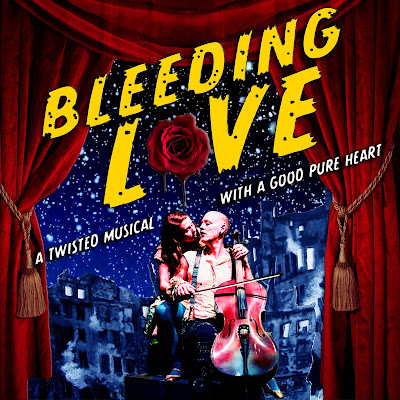Review: "Bleeding Love" is Evidence that You “Can’t Stop Musical Theater”
Bleeding Love
Book by Jason Schafer
Music by Arthur LaFrentz Bacon
Lyrics by Harris Doran
Directed and edited by Harris Doran
Presented by Dori Berinstein, Alan Seales, and the Broadway Podcast Network, in association with Kent Nicholson, Katie Rosin, and Steve Saporito
Available wherever podcasts are found, including Broadway Podcast Network, Apple Podcasts, and Spotify
 |
| Image courtesy Kampfire PR |
Quarantined listening to a musical about quarantine would seem like the last thing our frayed nerves need right now. However, my little, frayed nerves really did need this musical. Bleeding Love, the creative child of Jason Schafer (book), Arthur LaFrentz Bacon (music), and Harris Doran (lyrics, editing, and direction), premiered in 2015 in Denmark and has come to us in our quarantined state as a podcast. You can access for it free from wherever you get your podcasts. Set “in a world where people are cloistered inside, because it’s too dangerous to go out,” Bleeding Love tells the story of six individuals and their loves and losses in a post-apocalyptic environment. Kingfisher Avenue (perhaps a reference to the bird) is the setting where all of the characters live in “a nearly deserted, post-apocalyptic metropolis.” This world is ennobled by snow, lack of resources, and loneliness. Three sets of people live together. In the building known as The Halcyon is Bronwyn (Sarah Stiles) and her great aunt, Madame Floy (Annie Golden). Floy berates Bronwyn for not playing the cello as well as she should. Stuck inside, Bronwyn longs for a love beyond the lonely apartment that she shares with her aunt. Also in the Halcyon is Tony the superintendent (Marc Kudisch) and his son Sweet William (Taylor Trensch). The other couple, Lolli (Rebecca Naomi Jones) and Puppy (Tony Vincent), live on the streets and scrounge for food and, mainly, drugs. Everyone in the Halcyon is terrified to leave the building. The lore that has been built up over the years is that the outside world is only full of “outlaws, hooligans, and wild drug fiends.” But Bronwyn sees the possibility of satiating her yearning for love when she begins to interact with Puppy and even teach him the cello. What follows is a tug of hearts as the characters search for meaning, drugs, their next meal, and an elusive red rose.
What stands out is the incredible ensemble cast as they belt the entirety of this musical. I suggest listening while you are running, because the music drives you. Of course, the listener will immediately think of the Leona Lewis song “Bleeding Love.” The musical has nothing to do with the song, but it is in the same emotional constellation as that song. Characters sing their hearts out for lust and longing for people and things which they cannot have. Alas, humans always want what they cannot have. Its characters are yearning for romantic love. And one of them literally bleeds for it. In his emotionally abusive relationship with Lolli, Puppy abuses his own body to express just how much he loves her. His love for her is shown to be of no use, as Lolli will never be satisfied. Bronwyn’s yearning for Puppy is just as intense, and she uses Sweet William and his affection for her to try to make something happen with Puppy. It seems that humans post-apocalypse are just as horrible to each other as they are right now.

Tropes drive much of the ease into musical theater. We can clearly recognize a character, and this is the case with Bleeding Love. Bronwyn is the naïve, eager ingénue looking for love in the tradition of Maria in West Side Story. Puppy is the bad boy in the tradition of Danny Zuko from Grease. But Bleeding Love takes these tropes and flips them on their head. I wish I could tell you how, but that would ruin things. Just take a listen. You think it will be a love story with a happy ending, but it is heartbreaking at the end. Nobody gets what they want, but humanity wins in the end because summer is coming. There’s a reminder in the musical of one of the things we seem to have forgotten amidst the COVID-19 crisis. All of this is happening in the midst of an environmental crisis. The musical reminds us of this and seems to have a subtext running through it saying that if we cared—even loved and yearned for—our environment as we did other humans, there might be some hope on the other side of this.
-Joseph Donica



Comments
Post a Comment